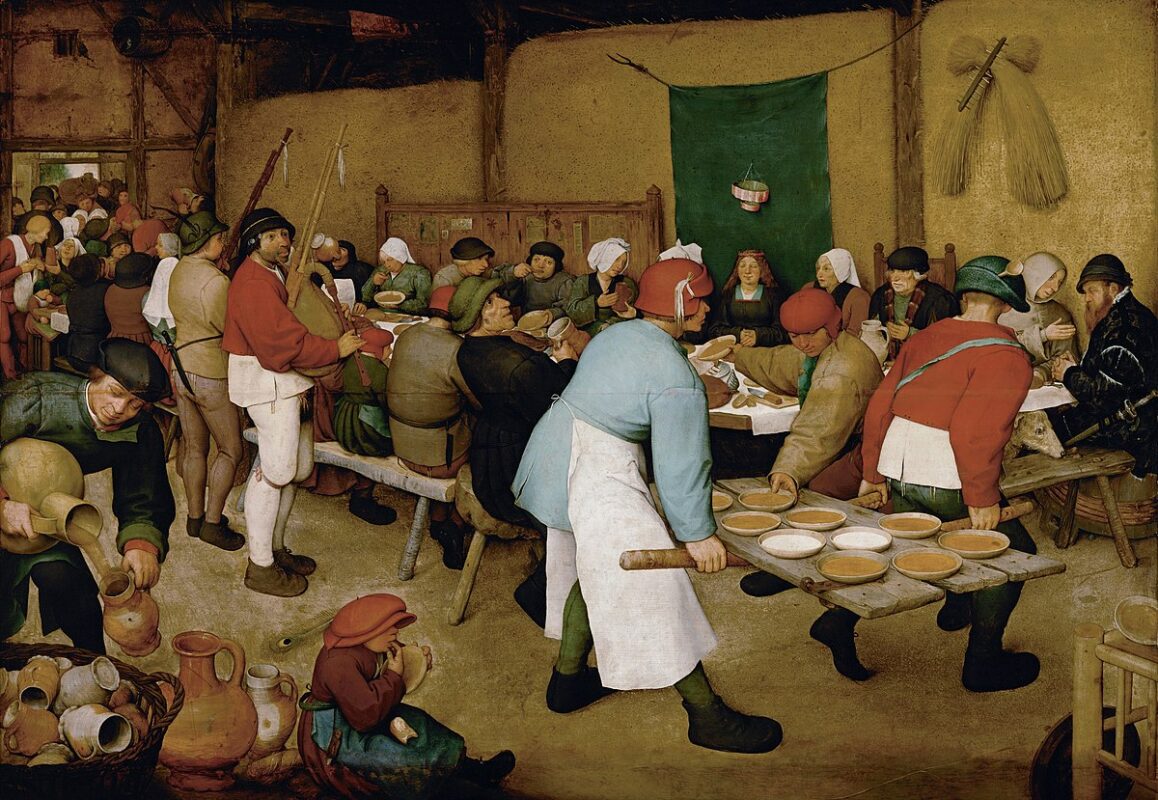There is a spirited debate among US progressives about the social and ethical dimensions of “identity politics.” Do such politics hamper collaboration or simply acknowledge the reality of the inequitable distribution of wealth and power? We don’t aim to settle the question but would rather like to add another category for discussion.
First, what is identity politics? Most use it to describe the project of developing and advancing political agendas from the shared experiences of injustice based on such categories as sex, sexual orientation, race, and ethnicity. Second, why is there disagreement? Some suggest this approach is in tension with a class-based politics that puts economics and the control of wealth at the center of the political struggle.
We are not going to weigh in on this often-fraught debate, though if we did we would take a cautious position that would highlight the complexity, seeing some merit in many of the arguments. Instead, we want to point out the centrality of another identity in most of the world: the Consumer.
People have always consumed things, of course—food, water, and various resources, those naturally occurring as well as manufactured by people using tools—but it is only recently that capitalism created the widespread identity of the Consumer. Our analysis of twenty-first-century identity politics starts with a simple claim: there are many identities that are the basis for differences among us that require continued attention in the pursuit of justice. And at the same time, we need to renounce the common identity of the Consumer.
Of course not everyone consumes at the same level, due to wealth disparities rooted in unjust social systems. But along with our obligation to struggle for justice, we need to tell stories about what it means to be human beings who consume to satisfy needs rather than people who conform to capitalism’s illusions to satisfy wants.
Our rallying cry: The end of the Consumer in us all!
People typically don’t want to see themselves this way. Indeed, both of us bristle at the thought of being lumped into the Consumer identity, since we pride ourselves on not keeping up with fashion or every new gadget. But it would be folly not to recognize and try to root out the Consumer in ourselves.
We don’t confine this identity to those who clamor for consumer goods that no one would consider necessities. Consider the people who line up to buy the latest smart phone or those who eagerly await the new version of a video game. Folks who shell out lots of money to attend spectator sports and buy team jerseys are Consumers. So are people who flood into a stadium to see a pop music star and buy the concert T-shirt. And the people who open their wallets for premium coffee and trendy baked goods. And the people who special order granite countertops to ensure the ultimate cooking experience. And on and on, up and down the aisles of stores, click after click on the websites.
We’re not saying that communication devices, home entertainment, sporting events, concerts, caffeinated beverages, breakfast pastries, or well-built kitchens have no value. We are saying that in a mass-marketed world, even items of real value get sold to us in ways that are as much about how we feel as what we need.
We don’t exempt ourselves. Jensen winces at the thought of the many years he bought books that he knew he likely would never read, simply because seeing those volumes on his bookshelf made him feel good and, he hoped, would convince others that he was smarter than he was. Jackson can point to the four vehicles in the driveway of his two-person home (older vehicles, but one car and one pickup per person), which he might argue is at least two and maybe three vehicles too many.
If any readers protest and claim to have rejected the Consumer label for themselves, that’s fine. But whatever self-image we have, the advertising and marketing wings of capitalist enterprises are clear about how they see us. “The way consumers see themselves determines their behavior—and you can influence that,” promise three business professors writing in the prestigious Harvard Business Review. “It’s surprisingly easy to make consumers switch identities and even to give them new ones.”
The business literature is crammed with research and strategies for how corporations can create and manipulate our identities and spending habits, mostly in the context of getting us to buy specific goods and services. But our focus is not on businesses’ competition for our allegiance to specific brands but rather the allegiance to consuming, the way a consumer capitalist economy needs us to embrace the identity of Consumer.
Rejecting the Consumer in us all and embracing a new identity isn’t so easy. Capitalism has depended on both state and private violence to get established and survive (think of imperial wars to acquire resources and establish markets, and decades of strike-breaking). But the strength of the identity of Consumer is maintained primarily through pleasure. For most people it feels good, at least in the short term, to consume. Once we settle into the Consumer identity, it’s surprisingly hard to escape, especially given how mass media and social media reinforce the pleasures of consuming as our capacity to imagine alternatives atrophies.
Because it’s so difficult for so many of us to extract ourselves from the consuming lifestyle, it’s tempting to argue that individual choices don’t matter and that it’s the economic system that needs to change. We agree with the latter observation; there is no way out on our own. We have to analyze the system and come up with political strategies that make it possible for all of us—as a society—to consume less per capita and more equitably distribute wealth. Though it’s not popular, that means we need to find a way to collectively impose limits on consumption and institute rationing to ensure fairness.
Freeing ourselves from the corrosive Consumer identity isn’t an individual task, but a call for system change rings hollow if we are afraid of personal change. How can we imagine a world beyond the Consumer if we can’t talk about our experiences of consuming and acknowledge that down-powering will not be easy?
Yes, for virtually all of human history, people lived without much of what we consume today in affluent societies. And some communities today lack access to all those goods. But neither of those observations is a solution. With nearly eight billion people and degraded ecosystems, the task is not to pretend we can easily replicate the past but to wrestle with impediments to a just and sustainable present and future. One of those impediments is what Wallace Stegner described as “things that once possessed could not be done without.”
To imagine new systems requires imagining new identities, new ways of being in the world. That requires facing not only what we don’t like about the existing economic system, but what we don’t like about ourselves.
This essay is drawn from An Inconvenient Apocalypse: Environmental Collapse, Climate Crisis, and the Fate of Humanity.
Image Credit: Pieter Bruegel the Elder, “The Peasant Wedding” (1566–69) via Wikipedia







9 comments
Martin
Great reflections, Jim O. I only would argue about “dishonor”. Already in the 19th century, Thorstein Veblen was critiquing “conspicuous consumption” of the sort you give excellent current examples of: https://en.wikipedia.org/wiki/The_Theory_of_the_Leisure_Class
Jim O
Identity politics normally involves the deliberate embrace of an identity: a person identifies as gay, or female, or black, and acts accordingly. This allows them to orient themselves in a well-defined frame that provides direction to their lives. This received identity may be a social construction; nevertheless, it is accepted as a form of personal validation.
The consumer identity is a little different. Some may crassly embrace it, but as you point out, many people tend to resist the label. This suggests that the consumer identity operates in a slightly different way than others.
As a social construction, being a consumer is embarrassing rather than empowering. There is dishonour in being so shallow. Nevertheless, we continue to act as consumers. In fact, we use our consumer choices to embrace other constructed identities: cyclists outfitted in the proper gear, connoiseurs who buy the right coffee, jet-setters with the best luggage.
The association of consumer choices with an identity is well understood. It is effected through branding, the deliberate construction of identity by advertisers. The realization that one is being constructed as a consumer by the entire capitalist system is obscured by the experience of being constructed as someone respectable or desirable on a social plane. It requires only a modicum of self-delusion to find relief in the latter identity, blotting out the former.
When we speak of social construction, we typically think of the social plane; thus we understand identity politics. The systemic construction of the capitalist environment goes unnoticed; it is the background of our lives, the invisible air. If it is mentioned or pointed out, one stirs up alarms about socialism or communism. Thus we fail, at times deliberately, to grasp the identity of consumerism, and this allows us to become prey to it.
Rob G
Correct: they are not new phenomena. But the internet has made them intensified phenomena. In the “old days” they were to a certain degree avoidable; there were ways of opting out. But now exposure to them is virtually inevitable. It’s the informational equivalent of not being able to turn one’s head anywhere without seeing a billboard. And the sheer ubiquity of it ironically deadens us to its presence.
Martin
Good points, Rob, but I don’t see those as new phenomena, only new examples of the same manipulations that were flagged nearly a century ago.
Martin
It seems strange to see this unabashed diatribe against consumerism completely omit the dimension of spirituality that is so often a key theme in FPR.
This essay’s condensation of their book (which I didn’t read) unfortunately presents sweeping generalizations like “wealth disparities rooted in unjust social systems”. Evidence? Wealth disparities have existed throughout history, imperial, feudal, and capitalistic. They are not “rooted” in injustice, but I agree that are often *corrupted* by it.
As for the three unnamed Harvard professors’ supposed insight about consumer influence, the notion of planned obsolescence dates back nearly a century:
https://en.wikipedia.org/wiki/Planned_obsolescence#History
The 1970s saw pushback against that manipulation, with numerous back-to-the-land groups forming, some of which have flourished. So, I’m not sure what is new in this appeal to resist advertising, other than a backdoor endorsement of the IMF’s austerity, which the two writers ominously hint as an upcoming fiat: “institute rationing”.
It seems that J & J are still stuck in the corporatist mentality of equating free enterprise (e.g., earned disparities, voluntary frugality rather than a moralistic imperative to “impose limits”) with capitalism (i.e., all of an organization’s income goes to those who own the means of production, and they choose how much to dole out as wages, etc.).
Their biggest problem, IMO, is a bubble mentality: prescribing change for developed countries as if it’s a universal movement that must be adopted by countries like India, Indonesia, and Brazil, which are finally enjoying widespread material prosperity: motor vehicles, cell phones, home repair, vitamins for kids, etc.
Rob G
“I’m not sure what is new in this appeal to resist advertising”
Advertising has become more personalized and individually targeted, thus more pernicious. You might be surprised to find out how many people fall for it, despite their awareness of its broader presence. For instance, I know plenty of people who don’t trust TV commercials but cannot tell the difference between clickbait and actual online news. Likewise, there are lots of folks who may have a general understanding of planned obsolescence but who see neither its near-universal application nor its relationship to fostering dependence on consumer goods.
Rob G
As someone put it, consumer capitalism seeks to sell luxuries by turning them into conveniences, then turning the conveniences into necessities. One of the ways I’ve learned to “reject the Consumer” is by forming the habit of always questioning things at the convenience level. I’ve done it for so long now it’s almost become automatic: you get to the point where when you’re presented with something “new and improved” the very first thing that springs to mind is, “Is there any sense in which I can say that I truly need this?”
In fact, this brings to mind something I heard someone say almost 25 years ago: we’ve become a society in which in many cases we are unable to tell the difference between wants and needs. Perhaps (re)learning to distinguish between the two might be a good way to begin “rejecting the Consumer.”
Russell Arben Fox
This is a good analysis, Rob. I agree that if you admit a convenience into your life for any length of time, it will inevitably take the form of a need, and at that point it will be far harder to resist. This is the way I’ve been able to resist the smartphone leap, and still just have my flip-phone: if I got one, to make use of its conveniences (which are obviously many), I’d naturally come to need it, so I need to draw the line while it’s still just a question of making things easier, rather than continuing to do something I will have come to need to do.
Rob G
I made exactly the same decision about the smartphone, Russell. I didn’t even get a regular cellphone until I truly needed one (I had a family situation which required me to be available as much as possible). Even then, however, I had friends who were annoyed because I refused to text!
I’ve made up my mind not to get a smartphone until the alternative is no longer available. I remember a few years back I met with some friends at a pub just after I had finished reading The Age of Surveillance Capitalism. My immediate pronouncement was that had I had a smartphone I would have “put an icepick through the *$%&@!! thing.” In fact, I’ve considered having a bumper sticker made: “State your independence: Icepick your smartphone.”
Comments are closed.